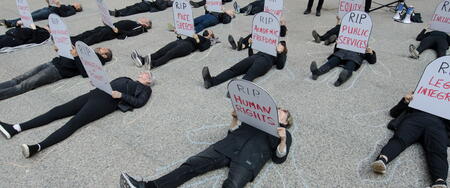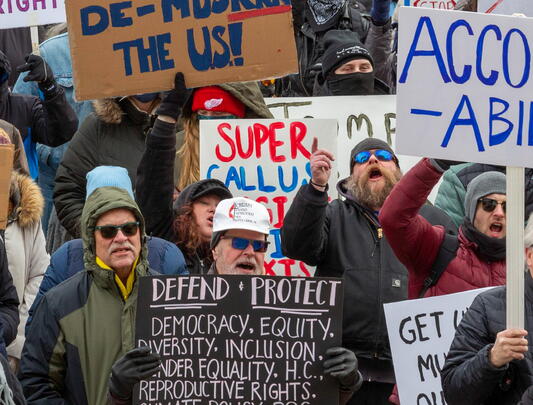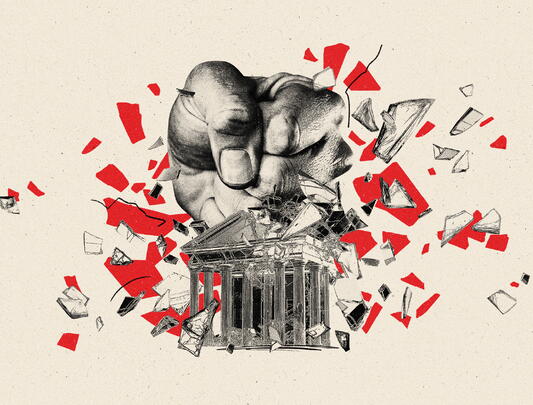
Illustrations: Aaron McConomy, Colagene, Creative Clinic
Collective Wisdom
How should democracies adapt for the 21st century?
One pressing question, multiple expert perspectives.
Take control of the narrative
Kamal Al-Solaylee
Professor and Director, School of Journalism, Writing, and Media
At the risk of sounding reactionary, democracies around the world have some lessons to learn from the authoritarian factions trying to destabilize or destroy them. Democratic nations and institutions must understand the gravity of, and forcefully respond to, the fact that we are living in an age of information wars and duelling narratives.
Democracies cannot take their existence for granted and cling on to the belief that citizens will choose them by default. Proponents of democracy must stop being reactive to the barrage of fake news and disinformation that the other side has become so powerful at creating and disseminating. Democracy needs a different and better story in the 21st century – one that connects its ideals to the economic and social aspirations of the people it serves. Until democratic nations learn to take control of the narrative wheel and pivot from reactive to proactive, they will continue to cede ground to their enemies. Democracy dies in darkness, but the glaring light of disinformation can be just as fatal.
Strengthen social inclusion
Joel Bakan
Professor of Law
Democracy cannot exist without a sense of political community among citizens, a feeling that, despite differences and diversities, they share a collective future and fate. Exclusion – whether economic or social, fuelled by discrimination, a consequence of colonialism, or any other kind – therefore corrodes democracy. Inclusion, and the social solidarity it fosters, enables it. This is why equal voting rights, fair elections, and civil liberties are, by themselves, insufficient for democracy to survive, let alone thrive.
Social equality and justice are also essential elements. As Chief Justice Dickson of the Supreme Court of Canada wrote, a free and democratic society must include: “Respect for the inherent dignity of the human person, commitment to social justice and equality, accommodation of a wide variety of beliefs, respect for cultural and group identity, and faith in social and political institutions which enhance the participation of individuals and groups in society.” For democracy to adapt to the 21st century, and successfully fend off the growing threat of illiberalism, it must widen and deepen these dimensions - its social dimensions.
Copy Canada!
Andrew Irvine
Professor of Philosophy
Canada’s system of parliamentary government has served Canadians well for over 150 years. It is a better form of government than the presidential system to the south. The rule of law, federalism, responsible government and the separation of powers have given Canadians stable, dependable government. What elements might the US consider copying?
First, they could return to paper ballots. Electronic voting hides the vote count. Paper ballots let scrutineers from every political party watch the count and report that the vote was fair.
Second, Canada’s independent electoral boundaries commissions apply a politically neutral formula to avoid the kind of endemic gerrymandering that plagues American electoral districts. Even if voters gravitate to the centre, gerrymandering guarantees that legislators have no incentive to find compromises the electorate supports.
Third, separating head of state from head of government makes good sense constitutionally and is preferable even at a ceremonial level, when recipients receive their honours from a politically neutral head of state rather than from a potentially divisive politician.
Canada already may be better prepared to face the turmoil of the 21st century than many other countries.
Accept responsibility for refugees
Helena Zeweri
Assistant Professor of Anthropology
Democracies must confront their role in producing the crisis of mass human displacement we see today. Military occupations, political meddling, and projects of economic extraction have been major drivers in the displacement of more than 122 million people – the highest figure since the end of World War II.
According to Brown University’s Costs of War Project, the Global War on Terror in Afghanistan, Pakistan, Iraq, Syria, Libya, Yemen, Somalia, and the Philippines has resulted in the external displacement of 38 million people. And the mass exodus from Central America and Haiti in recent decades has been catalyzed by prolonged political interference by current and former imperial powers that mobilize private entities and humanitarian organizations to do their bidding.
And yet liberal democracies are constantly developing new strategies to keep the displaced out – from deterrence to deportation to detention. Liberal democracies that are signatories to the UN Refugee Convention need to treat the provision of refuge not only as a standalone commitment but also as a responsibility they have toward those whose lives they have damaged.
Find the middle ground
Bradley Miller
Associate Professor of History
We’re living in a time of heightened political tension, where the appeal of radical, burn-it-all-down solutions has gained ground globally. In this moment, governments and civil society must safeguard their legitimacy and empower political centrists to roll their eyes at calls for upheaval – not at the institutions themselves. That means moving carefully, being genuinely inclusive, and backing off issues where broad consensus doesn’t exist, however worthy the causes may seem.
For Canada, this means embracing fiscal pragmatism. Canadians want investments in infrastructure, defence, and health – but they also see a government that’s grown bloated and ineffectual. They want leaders willing to ask what government can stop doing. Many are also worried about lagging private-sector productivity and feel institutions like the CBC and our universities have grown too doctrinaire and preachy. A conservative should be able to watch a CBC documentary or take a humanities class without feeling like they’ve entered a parallel universe – and a progressive arts graduate should be able to envision a desirable future for themselves in a successful business. If democracy is to thrive, its institutions must feel like they belong to all of us.
Recommit to collective agency
Chris Tenove, BA'99, MJ'01, PhD'15
Research Associate, School of Public Policy and Global Affairs
Several factors are driving democratic backsliding, including deeply felt insecurity, a politics of grievance, and dysfunctional information systems. Under these conditions, citizens may defer their collective agency to authoritarian or technocratic leaders. Instead, we should recommit to collective agency and support it with appropriate infrastructure.
Democracies pursue practical solutions for all affected by problems, like economic or environmental insecurity, rather than ignoring or demonizing others facing similar predicaments. We need big wins to demonstrate the value of democratic collective agency – such as a major green energy expansion that lowers energy bills, or a cross-generational improvement in housing accessibility. These require government leadership and mass participation by civil society and industry.
Our information system exacerbates divisions and undermines collective action. Social media and artificial intelligence should be regulated to prevent harms, but we also need investment in digital participation infrastructure that supports collective agency.
Big wins and a transformed communication infrastructure are whole-of-society projects, and they can only work if we recommit to a vision of democracy as truly collective action.



































